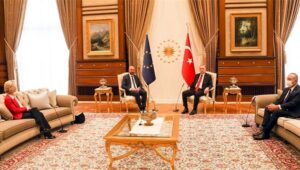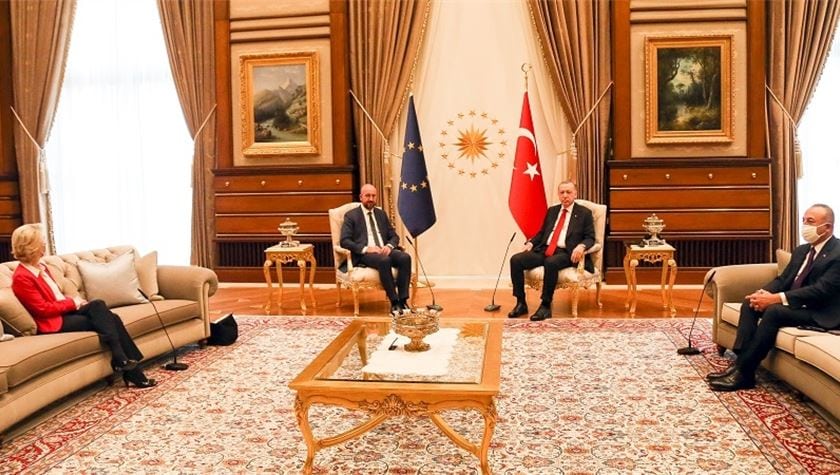
Photo by European Commission Audiovisual
by Irini Spyrou
Scandalous sofa incidents are nothing new: history classes prove their worth once again as we attempt to comprehend the obscene interaction between Turkish President Erdogan and President of the European Commission Ursula von der Leyen this past April.
Close your eyes and travel with me, back to the year 1677, to the place of current-day Istanbul. When meeting with Charles Olier, Marquis of Nointel and Louis XIV’s ambassador of France, Kara Mustafa, Grand Vizier of the Ottoman Empire, seated him, not on an ornate tabouret, but on the sofa, placing him at a lower level than himself. This manner of seating somebody on a physically lower level induced the perception that France was a lesser geopolitical actor than the Turkish Empire – quite literally putting them in their place. As the news of this humiliation spread, the unfortunate Olier lost his position, degraded for having accepted such indignity. If we flash forward to 2021, a skillful reproduction of this well-known sofa scene has been orchestrated by Turkish President R.T. Erdogan during President von der Leyen’s latest visit to Ankara.
Allow me to set the scene for you:
Ursula von der Leyen (President of the Commission) and Charles Michel (President of the European Council) enter the auditory room to meet President Erdogan. The trio is presented with only two seats of honor—one for each important man in the room—and Madame von der Leyen is forced to stand aside. With no other seat available, the first female President of the Commission was left to sit on a sofa—a place reserved for the less important actors of this meeting—while the two men took center stage. Suspicions of intent surrounding this event rose when an EU protocol service allegedly wished to visit the room prior to the encounter but was refused entry. This move is especially apropos considering current political activity in Turkey: the government has left the Istanbul Convention, a 2011 Council of Europe text dedicated to the protection of violence against women and children, particularly focusing on domestic violence. Ironically, it was a subject brought up in the three-hour meeting and represented a “deep worry” for the Commission’s President.
We can understand this international shame leveled at Madame von der Leyen as a triple degradation of the European Union; firstly against the female population, secondly against the Commission as an institution, and thirdly against the values of the European Union as a whole. The facts of this meeting point towards a deliberate political message, one which should sicken the European people. This is another moment in which the European Union was unable to defend itself and behave in a manner aligned with its demographic, economic, and political stature, whilst abiding by its core values. One could argue that accepting such treatment by the Turkish President was bad politics and quite possibly an institutional and strategic mistake.
To give in to the provocation of Mr. Erdogan jeopardizes the progress that has been made. The pawns of the political game no longer lie exclusively in the hands of men. The contributions of female politicians in foreign and security affairs are not only remarkable but remain essential moving forward if the Union’s actors wish to honor its values publicly. This projection of a weak image is a costly one at that, given the 6 billion allocated to Turkey to maintain migrants on their soil (a sum even higher than the funds given to the EU4Health program devoted to the health of 400 million Europeans). As citizens of the EU, we should demand vigorous and swift responses to the undignified treatment of our representatives. The EU has been deeply diplomatically cooperative and tolerant with Mr. Erdogan concerning military interventions in the Middle East, threats against Greece relating to marine law conventions, and even regarding the concerning state of the freedom of the press and the treatment of women. Via this weak demonstration of joint external policy, the EU’s political standing has been blatantly undermined, with Erdogan echoing his predecessors and besmirching the Decadent West, once more. The real challenge for the future is that relations between the EU and Turkey must remain cordial, given our regional codependency in regards to the migrant influx and the Cyprus question. Nevertheless, it is unprincipled to collaborate, with the tolerance that the EU does, with a government that progressively erodes democracy and the rule of law on its territory.
Other posts that may interest you:
Discover more from The Sundial Press
Subscribe to get the latest posts sent to your email.





